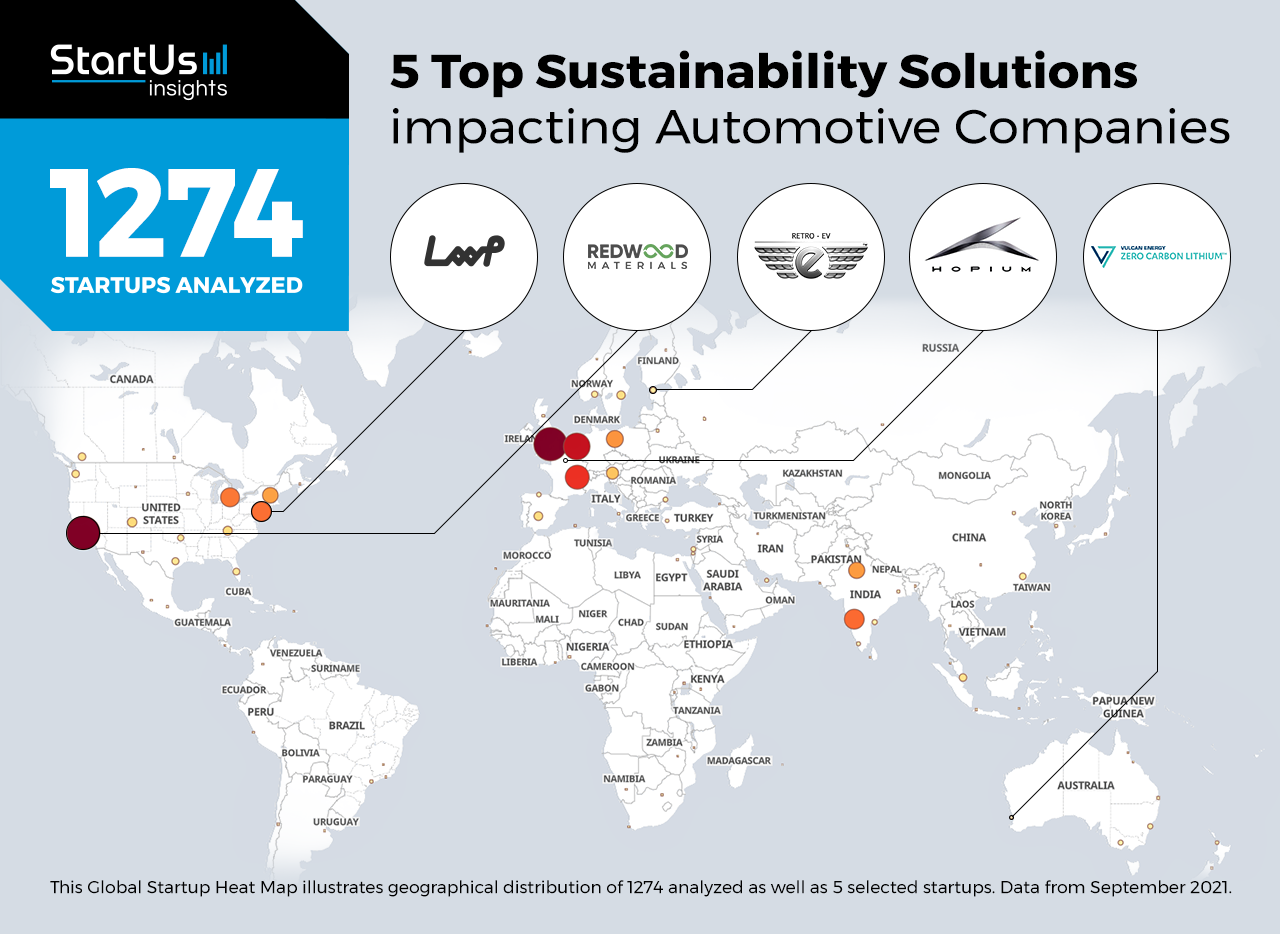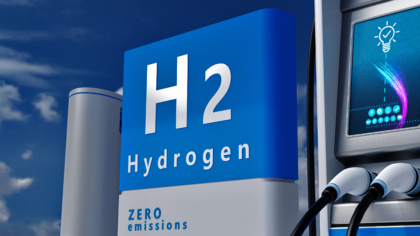Staying ahead of the technology curve means strengthening your competitive advantage. That is why we give you data-driven innovation insights into the automotive industry. This time, you get to discover 5 hand-picked sustainability solutions impacting automotive companies.
Global Startup Heat Map highlights 5 Top Sustainability Solutions impacting Automotive Companies out of 1 274
The insights of this data-driven analysis are derived from the Big Data & Artificial Intelligence-powered StartUs Insights Discovery Platform, covering 2 093 000+ startups & scaleups globally. The platform gives you an exhaustive overview of emerging technologies & relevant startups within a specific field in just a few clicks.
The Global Startup Heat Map below reveals the distribution of the 1 274 exemplary startups & scaleups we analyzed for this research. Further, it highlights 5 startups that we hand-picked based on criteria such as founding year, location, funding raised, and more. You get to explore the solutions of these 5 startups & scaleups in this report. For insights on the other 1 269 sustainability solutions impacting automotive companies, get in touch.
Redwood Materials advances Automotive Waste Recycling
Plastic, rubber, and metal are necessary components in automotive manufacturing. Metals improve the strength and durability of the vehicle, whereas plastics, glass, and leather find applications in enhancing safety and comfort. The production of these materials is often resource-intensive as well as contributes to carbon emissions and climate change. To tackle this, automotive manufacturers promote sustainable sourcing and processing methods to check unsustainable raw materials and reduce material wastage at production floors. For example, replacing plastic parts with biomaterial alternatives lowers the manufacturer’s carbon footprint significantly.
Redwood Materials is a US-based startup that provides materials recycling, remanufacturing, and reuse solutions. The startup works directly with electric vehicle (EV) manufacturers to recycle production waste, allowing manufacturers to convert disposal cost liability into a revenue recovery system. This further reduces the battery and EV production costs and accelerates EV adoption. Moreover, Redwood Materials enables circular supply chains in the automotive sector, thereby further decreasing environmental impacts.
Vulcan Energy develops Zero-Carbon Lithium Batteries
Vehicles that run on alternative fuels are critical in decarbonizing the automotive sector. Hence, original equipment manufacturers (OEMs) are developing EVs along with hydrogen- and solar-powered vehicles to promote a zero-carbon economy. However, the sustainability of these vehicles depends on the fuels they use. For instance, EVs recharging from an electric grid that runs on non-renewable energy resources increases carbon emissions. Therefore, startups develop resilient renewable energy storage and production systems to facilitate the decarbonization of the automotive industry.
Australian startup Vulcan Energy produces zero-carbon lithium batteries for electric vehicles. The startup’s proprietary process pumps geothermal brine into the surface and uses its energy to extract lithium with direct lithium extraction (DLE). The brine is then re-injected into the geothermal reservoir after lithium extraction. Besides, the startup generates geothermal energy from the excess heat and sells it to the grid, offering a new power and income source. As a result, the batteries made from Vulcan Energy’s lithium reduces the overall carbon footprint of electric vehicles.
Retro-EV offers EV Retrofitting
Governments are actively incentivizing electric vehicles to fight global warming and climate change. Even then, their high price and lack of charging infrastructure are slowing down automobile electrification. However, OEMs and startups are installing charging stations and networks to facilitate this transition. To further promote electrification, some startups retrofit conventional vehicles that run on petroleum-based fuels with EV systems, allowing vehicle owners to convert their combustion engine vehicles into EVs at low costs.
Retro-EV is a Finnish startup that offers EV retrofitting for older car models. The startup’s patent-pending EV technology combines PowerPod intelligent battery system, liquid thermal management, and onboard telemetry units. The modular aspect of the PowerPod also allows vehicle owners to upgrade the battery components based on available upgrades in the market. In effect, Retro-EV’s vehicle remanufacturing improves the vehicle’s useful span and sustainability at low costs.
Loop Vehicles provides Carbon-Negative EVs
Renewable energy integration into existing power grids is essential to decarbonize electric vehicles. Otherwise, the overall carbon footprint of EVs will continue to rise. That is why startups develop decentralized and low-carbon energy production to refuel electric vehicles. For instance, solar-powered vehicles are independent of the grid as well as store excess power on their batteries. Such solutions enhance the sustainability of EVs as well as reduce fuel costs for the user.
US-based startup Loop Vehicles develops carbon-negative vehicles. The startup makes use of its proprietary carbon-capture electricity generation technology to power its cars. In addition, it provides metal cartridges that allow vehicle owners to replenish batteries without charging stations. Loop Vehicles also collects the chemicals produced in the batteries and uses them to reduce refueling costs for the users.
Hopium develops Hydrogen-Powered Cars
Range anxiety and recharging periods are the other factors that limit EV adoption, especially in long-hauling. Besides, the sustainability of lithium extraction is questionable and will take longer to develop eco-friendly extraction methods. On the other hand, hydrogen offers high energy per mass, and the minerals for hydrogen fuel cells are often byproducts of copper and nickel extraction processes. Hence, hydrogen-powered vehicles offer more range and are sustainable than battery-powered EVs. That is why startups develop hydrogen production, storage, and fuel cell solutions, which allows auto manufacturers to reduce the time to market and capital expenses of their hydrogen vehicles.
Hopium is a French startup that manufactures Machina, a hydrogen-powered car. The startup uses its proprietary platform to develop a hydrogen fuel cell system that delivers 500 horsepower and a range of 620 miles/1 000 kilometers. To achieve this, Hopium combines a zero-emission power source with optimized volumetric density, two hydrogen tanks, and a peak power battery pack along with an aerodynamic design. Additionally, the ascending fuselage on the front of the vehicle optimizes fuel cell cooling, delivering better performance.
Discover more Automotive Startups
Automotive startups such as the examples highlighted in this report focus on electrification, autonomous driving as well as lightweight materials. While all of these technologies play a major role in advancing the automotive industry, they only represent the tip of the iceberg. To explore more automotive technologies, simply get in touch to let us look into your areas of interest. For a more general overview, you can download our free Automotive Innovation Report to save your time and improve strategic decision-making.





![Explore the Future of AI in the Automotive Industry [2025 & Beyond]](https://www.startus-insights.com/wp-content/uploads/2024/10/Future-of-AI-in-Automotive-Industry-SharedImg-StartUs-Insights-noresize-420x236.webp)




